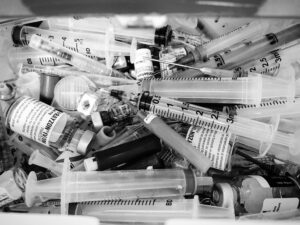Guest post by Rebecca Muir
Addiction is a pernicious and dangerous foe. It not only impacts you directly if you struggle with it, but it can also indirectly and even directly impact others – loved ones, family and friends, employers, and society at large. Yet the insidious nature of addiction can leave you in denial of your situation or feeling hopeless and helpless to change your plight. No matter where you or your loved one is in the struggle with addiction, it helps to understand more about what you’re dealing with and more about addiction treatment and recovery.
Addictions tend to fall into two categories: substance addictions or behavioral addictions (sometimes called process addictions). Let’s take a look at each of those and then at some addiction treatment resources.
Substance Use Disorder
Addiction to substances is the more widely known category when it comes to addiction. Professionals who provide addiction treatment services refer to abuse or dependence problems with a substance as substance use disorder. These overtly harmful addictions to substances include addiction to alcohol and addiction to illicit drugs. What’s important for you to know about these addictions is that they contain a physical dependence component that is best treated by credentialed medical professionals.
There is also a significant psychological component to substance addiction. Mental health professionals can treat this component. Treatment can be in the form of support groups, individual therapies, group therapy, or family therapy. In addition, there are outpatient substance abuse treatment programs and inpatient substance dependence treatment programs. The more ingrained the addiction, the higher level of care is generally needed for treatment. Inpatient substance abuse treatment programs in rehabilitation facilities often include medical treatments for physical dependence as part of their program.
According to the American Addiction Centers, symptoms of substance use disorder can include:
- Unsuccessful attempts to control, decrease, or stop substance use
- Continued substance use despite the problems it causes
- Cravings for the substance
- Excessive time spent obtaining, using, and/or recovering from a substance
- Using the substance more than intended
- An ongoing need to increase use to achieve the same effect (also known as tolerance)
- Recurrent use of the substance in increasingly risky situations
- Negative effects on relationships due to substance use
- Stopping or decreasing important activities due to the substance
- Substance use interfering with fulfilling obligations
- Experiencing withdrawal symptoms if the substance is stopped
Behavioral Addictions
Less widely known are behavioral addictions, also called process addictions. American Addiction Centers defines these addictions as “the compulsion to continually engage in an activity or behavior despite the negative impact on the person’s ability to remain mentally and/or physically healthy and functional in the home and community.”
You have a behavioral addiction if you are addicted to compulsively doing the behavior, often because of the internal dopamine “high” that comes from engaging in the behavior. Research shows that those with process addictions have the same excessive dopamine release in the brain that rewards the behavior as those with addictions to substances.
Common behavioral addictions include:
- Gambling
- Food
- Shopping
- Sex
- Exercise
- Television
- Internet Surfing
- Social Media Scrolling
- Texting
- Gaming
Related Reading: Stages of Addiction
Addiction Support Groups
Addiction support groups can go a long way in facilitating lasting, long-term recovery. Research shows a significant increase in the success rate of maintaining your recovery when participating in a long-term support group.
Perhaps most widely known are the Twelve Step programs such as Alcoholics Anonymous (AA), Narcotics Anonymous (NA), and behavioral addiction groups such as Co-Dependents Anonymous, Food Addicts Anonymous, Gamblers Anonymous, and Sexaholics Anonymous. These Twelve Step programs, in addition to over 300 others for addictions and psychological disorders based on this model, provide an effective program for those in recovery (particularly if paired with therapy). However, they are not a great fit for everyone because of the religious undertones of the group’s core materials. There are many alternatives such as SMART Recovery, LifeRing, SOS Sobriety, Refuge Recovery, and Women for Sobriety, among others, that provide a more secular approach to recovery and sobriety.
There are support groups for family members and friends of addicted people, too. Al-Anon for those affected by another person’s alcoholism is the most well-known of these. Others are available, too, including Nar-Anon for those affected by another person’s substance use, S-Anon for those troubled by another person’s sexual behavior, and Gam-Anon for those affected by someone’s gambling.
Addiction Treatment Services
When considering addiction treatment programs for yourself or a loved one, it is important to consult with your medical doctor first to evaluate if physical dependency and withdrawal symptoms need to be addressed first in a medical setting. Some addictions, such as heroin and opioid addiction, can have dangerous, life-threatening withdrawal symptoms.
When considering longer-term treatment and recovery, it is important to look at all facets of addiction including risk factors for relapse and the possibility of dual-diagnosis and comorbidities. Alcohol and drug addiction, as well as behavioral addictions, are often found to occur with underlying mental health disorders such as depression, anxiety, insomnia, PTSD, and trauma. Accordingly, it is important to treat these mental health issues, if present, in conjunction with the addiction itself.
Related Reading: How to Motivate an Addict to Stay Clean
SAMHSA (Substance Abuse and Mental Health Services Administration) has a wealth of information and resources for both substance and process addictions, including information about the addiction treatment process. They also have a convenient Behavioral Health Treatment Services Locator to help people find the closest addiction treatment outpatient services options available.
Incorporating mindfulness and meditation practices at all stages of addiction and recovery can go a long way in helping you identify and critically analyze addictive triggers, rituals, and behaviors. It always benefits you to be aware of our thoughts and feelings, and how they impact your actions. Mindfulness and meditation practices are two very effective ways to do this. Whether you are a veteran or new to these concepts, I highly recommend Calm, Insight Timer, and FitMind apps as resources to help guide your meditation and mindfulness journey.
Life Care Wellness offers individual therapy and runs group therapy on occasion for addiction treatment. If you’re in northern Illinois, please get in touch with us at our Glen Ellyn, Chicago (Jefferson Park), Sycamore or Yorkville offices to learn how we can help.
Rebecca is currently attending the online Master of Social Work program of Tulane University in Louisiana. She enjoys incorporating mindfulness-based strategies during therapy and encourages clients to use them outside of sessions to help create a more peaceful, joy-filled life. Rebecca is a Board-Certified Autism Technician (BCAT) as well as a Mindfulness and Meditation Therapist. As an intern at Life Care Wellness, she accepts clients on a reduced self-pay basis. Her low sliding scale allows individuals of all financial backgrounds to receive therapy.





